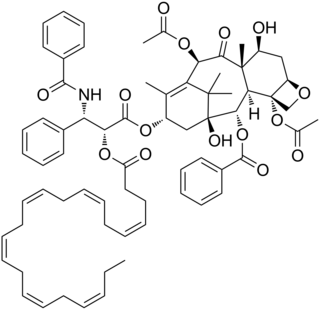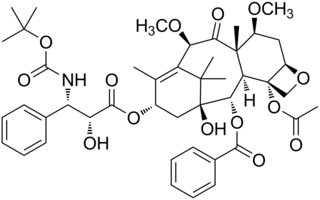Related Research Articles

Paclitaxel (PTX), sold under the brand name Taxol among others, is a chemotherapy medication used to treat a number of types of cancer. This includes ovarian cancer, esophageal cancer, breast cancer, lung cancer, Kaposi's sarcoma, cervical cancer, and pancreatic cancer. It is given by injection into a vein. There is also an albumin-bound formulation.
An inotrope is an agent that alters the force or energy of muscular contractions. Negatively inotropic agents weaken the force of muscular contractions. Positively inotropic agents increase the strength of muscular contraction.
Wolters Kluwer N.V. is an Dutch information services company. The company is headquartered in Alphen aan den Rijn, Netherlands (Global) and Philadelphia, United States (corporate). Wolters Kluwer in its current form was founded in 1987 with a merger between Kluwer Publishers and Wolters Samsom. The company serves legal, business, tax, accounting, finance, audit, risk, compliance, and healthcare markets. It operates in over 150 countries.

In human anatomy, the masseter is one of the muscles of mastication. Found only in mammals, it is particularly powerful in herbivores to facilitate chewing of plant matter. The most obvious muscle of mastication is the masseter muscle, since it is the most superficial and one of the strongest.

Docetaxel, sold under the brand name Taxotere among others, is a chemotherapy medication used to treat a number of types of cancer. This includes breast cancer, head and neck cancer, stomach cancer, prostate cancer and non-small-cell lung cancer. It may be used by itself or along with other chemotherapy medication. It is given by slow injection into a vein.
Bruit, also called vascular murmur, is the abnormal sound generated by turbulent flow of blood in an artery due to either an area of partial obstruction or a localized high rate of blood flow through an unobstructed artery.
A spindle poison, also known as a spindle toxin, is a poison that disrupts cell division by affecting the protein threads that connect the centromere regions of chromosomes, known as spindles. Spindle poisons effectively cease the production of new cells by interrupting the mitosis phase of cell division at the spindle assembly checkpoint (SAC). However, as numerous and varied as they are, spindle poisons are not yet 100% effective at ending the formation of tumors (neoplasms). Although not 100% effective, substantive therapeutic efficacy has been found in these types of chemotherapeutic treatments. The mitotic spindle is composed of microtubules that aid, along with regulatory proteins; each other in the activity of appropriately segregating replicated chromosomes. Certain compounds affecting the mitotic spindle have proven highly effective against solid tumors and hematological malignancies.

Taxanes are a class of diterpenes. They were originally identified from plants of the genus Taxus (yews), and feature a taxadiene core. Paclitaxel (Taxol) and docetaxel (Taxotere) are widely used as chemotherapy agents. Cabazitaxel was FDA approved to treat hormone-refractory prostate cancer.

Taxus canadensis, the Canada yew or Canadian yew, is a conifer native to central and eastern North America, thriving in swampy woods, ravines, riverbanks and on lake shores. Locally called simply "yew", this species is also referred to as American yew or ground-hemlock.

Paclitaxel total synthesis in organic chemistry is a major ongoing research effort in the total synthesis of paclitaxel (Taxol). This diterpenoid is an important drug in the treatment of cancer but, also expensive because the compound is harvested from a scarce resource, namely the Pacific yew. Not only is the synthetic reproduction of the compound itself of great commercial and scientific importance, but it also opens the way to paclitaxel derivatives not found in nature but with greater potential.
Lippincott Williams & Wilkins (LWW) is an imprint of the Dutch publishing conglomerate Wolters Kluwer. It was established by the acquisition of Williams & Wilkins and its merger with J.B. Lippincott Company in 1998. Under the LWW brand, Wolters Kluwer, through its Health Division, publishes scientific, technical, and medical content such as textbooks, reference works, and over 275 scientific journals. Publications are aimed at physicians, nurses, clinicians, and students.

Taxus globosa, the Mexican yew, is an evergreen shrub and one of the eight species of yew. The Mexican yew is a rare species, only known to be found in a small number of locations in eastern Mexico, Guatemala, El Salvador and Honduras, and is listed as an endangered species. The Mexican yew is a shrub that grows to an average height of 4.6m. It has large, sharp light green needles growing in ranks on either side of its branches.

DHA-paclitaxel is an investigational drug made by linking paclitaxel to docosahexaenoic acid (DHA), a fatty acid that is easily taken up by tumor cells; the DHA-paclitaxel “appears not to be cytotoxic until the bond with DHA is cleaved within the cell.” The advantage of DHA-paclitaxel over paclitaxel is DHA-paclitaxel's ability to carry much higher concentrations of paclitaxel to the cells, which are maintained for longer periods in the tumor cells, thus increasing their action. With increased activity, DHA-paclitaxel, also known as Taxoprexin, may have a more successful response in cancer patients than Taxol, and it may be able to treat more types of cancer than Taxol has been able to treat.

Cabazitaxel, sold under the brand name Jevtana, is a semi-synthetic derivative of a natural taxoid. It was developed by Sanofi-Aventis and was approved by the U.S. FDA for the treatment of hormone-refractory prostate cancer on June 17, 2010. It is a microtubule inhibitor, and the fourth taxane to be approved as a cancer therapy.

Abeotaxanes are a class of taxoid molecules with a core 5/7/6 type ring structure. This structure varies from the 6/8/6 or 6/10/6-membered core ring found in conventional taxoids such as paclitaxel or docetaxel. The core carbon skeleton of a normal natural product taxane has a 6-membered A ring, 8-membered B ring and a 6-membered C ring, combined with conventional side chains. It is the side chains that provide most of the activity for regular taxanes. Abeotaxanes are compounds containing 3 altered ring structures, where ring A is 5 members, ring B is 7 members and ring C is 6 members, combined with conventional side chains.

Taccalonolides are a class of microtubule-stabilizing agents isolated from Tacca chantrieri that has been shown to have selective cancer-fighting properties. Other examples of microtubule-stabilizing agents include taxanes and epothilones, both of which prevent cancer cells from dividing by interfering with tubulin. While taxanes like Paclitaxel and docetaxel have been used successfully against breast, ovarian, prostate, and non–small-cell lung cancers, intrinsic and acquired drug resistance limit their anticancer properties. Unlike taxanes, taccalonolides appear to work through a different mechanism of action that does not involve tubulin, although recently isolated taccalonolides AF and AJ have shown tubulin-interaction activity. The discovery of taccalonolides opens up new possibilities to treat cancer cells, especially ones that are taxane or epithilone resistant.

Taxusin is a taxane isolate derived from Taxus wallichiana. Taxusin can be used to synthesize taxadiene -diol and -triol derivatives via deoxygenation.

Milataxel is a taxol analog.

Taxine alkaloids, which are often named under the collective title of taxines, are the toxic chemicals that can be isolated from the yew tree. The amount of taxine alkaloids depends on the species of yew, with Taxus baccata and Taxus cuspidata containing the most. The major taxine alkaloids are taxine A and taxine B although there are at least 10 different alkaloids. Until 1956, it was believed that all the taxine alkaloids were one single compound named taxine.

Iwao Ojima is a Japanese-American chemist and university distinguished professor at the State University of New York at Stony Brook. He has been widely recognized for his seminal contributions to a range of chemical research at the multifaceted interfaces of chemical synthesis and life sciences. As rare accomplishments, he has received four National Awards from the American Chemical Society in four different fields of research. He is also serving as the director of the Institute of Chemical Biology and Drug Discovery (ICB&DD), as well as the president of the Stony Brook Chapter of the National Academy of Inventors.
References
- ↑ "Taxoids: New Weapons against Cancer" (PDF). 1996.
- ↑ Elsevier, Dorland's Illustrated Medical Dictionary, Elsevier.
- ↑ Wolters Kluwer, Stedman's Medical Dictionary, Wolters Kluwer.
- ↑ Timmerman, H. (16 June 1995). The Chemistry and Pharmacology of Taxol® and its Derivatives. Elsevier. p. 7. ISBN 978-0-08-054499-1.